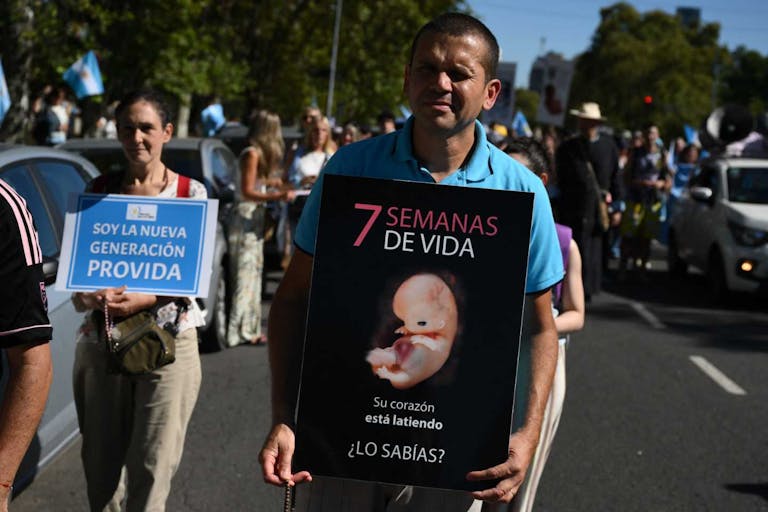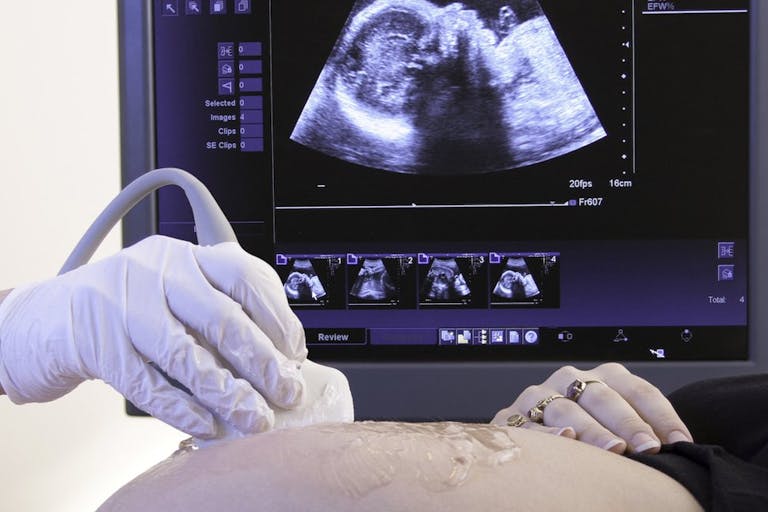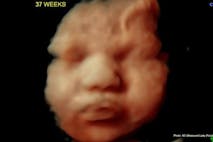
Latin America’s conservative comeback powers pro-life push at UN
Rai Rojas
·
Human Interest·By Amanda Vicinanzo
New AI technology helps diagnose congenital heart defects in the womb
Congenital heart defects (CHD) are the most common cause of infant death due to birth defects in the United States and about 25% of children born with a CHD will need heart surgery or other interventions to survive. A prenatal diagnosis can provide doctors with many opportunities to intervene; however, many pregnant women do not know their child has CHD until after birth, delaying the needed treatments. That could all change thanks to a novel medical breakthrough by researchers at the University of California, San Francisco, who have developed an artificial intelligence (AI) model that significantly improves prenatal detection of CHD on fetal screening ultrasound exams.
Pregnant women typically receive a fetal screening ultrasound in the second trimester. According to the researchers, these ultrasounds can enable clinicians to diagnose up to 90% of congenital heart disease cases; however, in practice, detection rates worldwide can be as low as 30%. Researchers attribute this gap to inadequate expertise in interpretation and poor-quality images from the motion of the preborn child and the small size of the fetal heart. They also surmised that some clinicians simply overlook CHD.
“Together, these make CHD detection one of the most difficult diagnostic challenges in ultrasound,” the research paper stated.
To improve prenatal detection of congenital heart defects, researchers applied deep learning—a subset of machine learning that mimics the human brain to identify patterns and classify different types of information—to ultrasound analysis. In a test set of 4,108 fetal surveys, the AI model achieved 95% sensitivity and 96% specificity, representing a significant improvement in current detection rates.
READ: Prenatal screening is a pro-life tool hijacked by the abortion industry
Article continues below
Dear Reader,
In 2026, Live Action is heading straight where the battle is fiercest: college campuses.
We have a bold initiative to establish 100 Live Action campus chapters within the next year, and your partnership will make it a success!
Your support today will help train and equip young leaders, bring Live Action’s educational content into academic environments, host on-campus events and debates, and empower students to challenge the pro-abortion status quo with truth and compassion.
Invest in pro-life grassroots outreach and cultural formation with your DOUBLED year-end gift!
In a spotlight interview, one of the lead researchers behind the study, Dr. Rima Arnaout, explained that her fascination with heart development began in college while studying eye formation in chicks.
“We pecked little holes in the eggs to watch the chick embryos, and you just couldn’t miss that the heart was pumping even before developing into a recognizable organ,” said Dr. Arnaout. “It struck me how vital heart structure and function are to life, even before birth. Yet how could something so important also be most commonly affected by birth defects? It was a conundrum I wanted to learn more about.”
Tragically, even with prenatal detection, many pregnant women turn to abortion after receiving a CHD diagnosis. Live Action News previously reported that a 2018 study published in the medical journal, JAMA Cardiology, found that in 2004, the abortion rate for babies with CHD was 0.6 percent. By 2013, it had skyrocketed to 39.1% after more prenatal screenings were offered, an increase of 65%.
It is important for pregnant women to know that congenital heart defects can be treatable. The research paper states that prenatal diagnosis can improve neonatal outcomes and allow for surgical planning and in-utero therapies. Advancements in prenatal screening have allowed doctors to perform life-changing and life-saving surgery on preborn children with a range of diagnoses including spina bifida and congenital diaphragmatic hernia. Yet rather than using prenatal screening as the pro-life tool that it is, abortion advocates use it to target children with health conditions for eugenic abortions. Hopefully, this new advancement using AI technology will help to save lives instead of ending them.
“Like” Live Action News on Facebook for more pro-life news and commentary!
Live Action News is pro-life news and commentary from a pro-life perspective.
Contact editor@liveaction.org for questions, corrections, or if you are seeking permission to reprint any Live Action News content.
Guest Articles: To submit a guest article to Live Action News, email editor@liveaction.org with an attached Word document of 800-1000 words. Please also attach any photos relevant to your submission if applicable. If your submission is accepted for publication, you will be notified within three weeks. Guest articles are not compensated (see our Open License Agreement). Thank you for your interest in Live Action News!

Rai Rojas
·
Politics
Nancy Flanders
·
Human Interest
Angeline Tan
·
Human Interest
Bridget Sielicki
·
Human Interest
Nancy Flanders
·
Human Interest
Nancy Flanders
·
Human Rights
Amanda Vicinanzo
·
Human Interest
Amanda Vicinanzo
·
International
Amanda Vicinanzo
·
Issues
Amanda Vicinanzo
·
Newsbreak
Amanda Vicinanzo
·